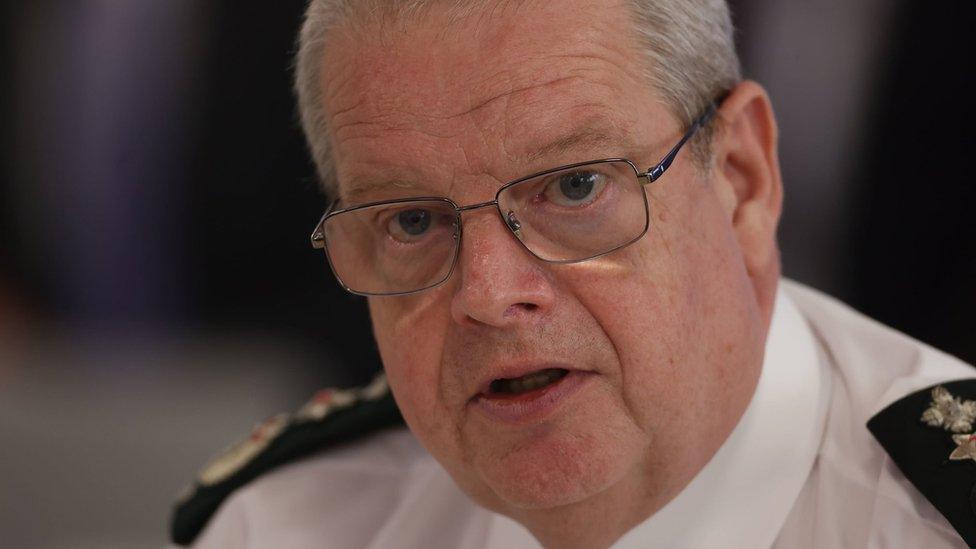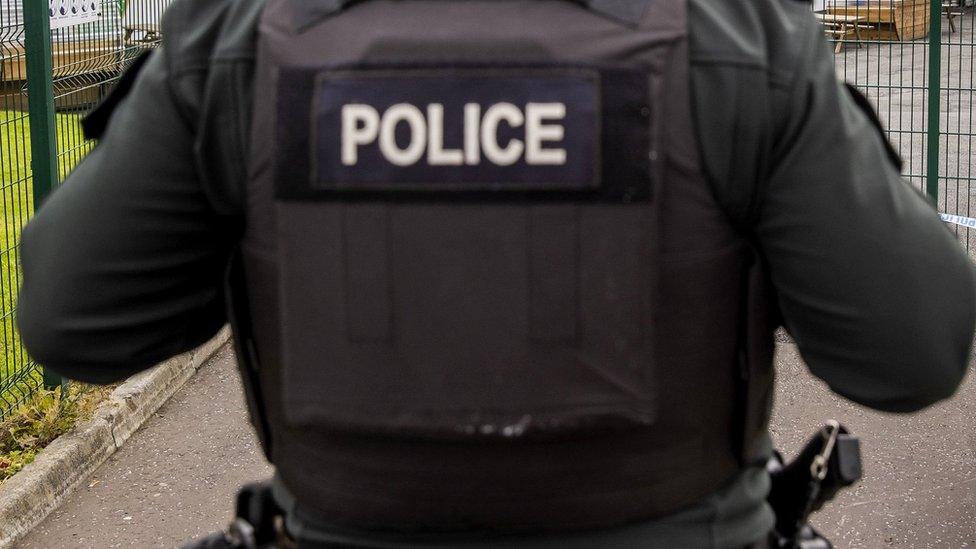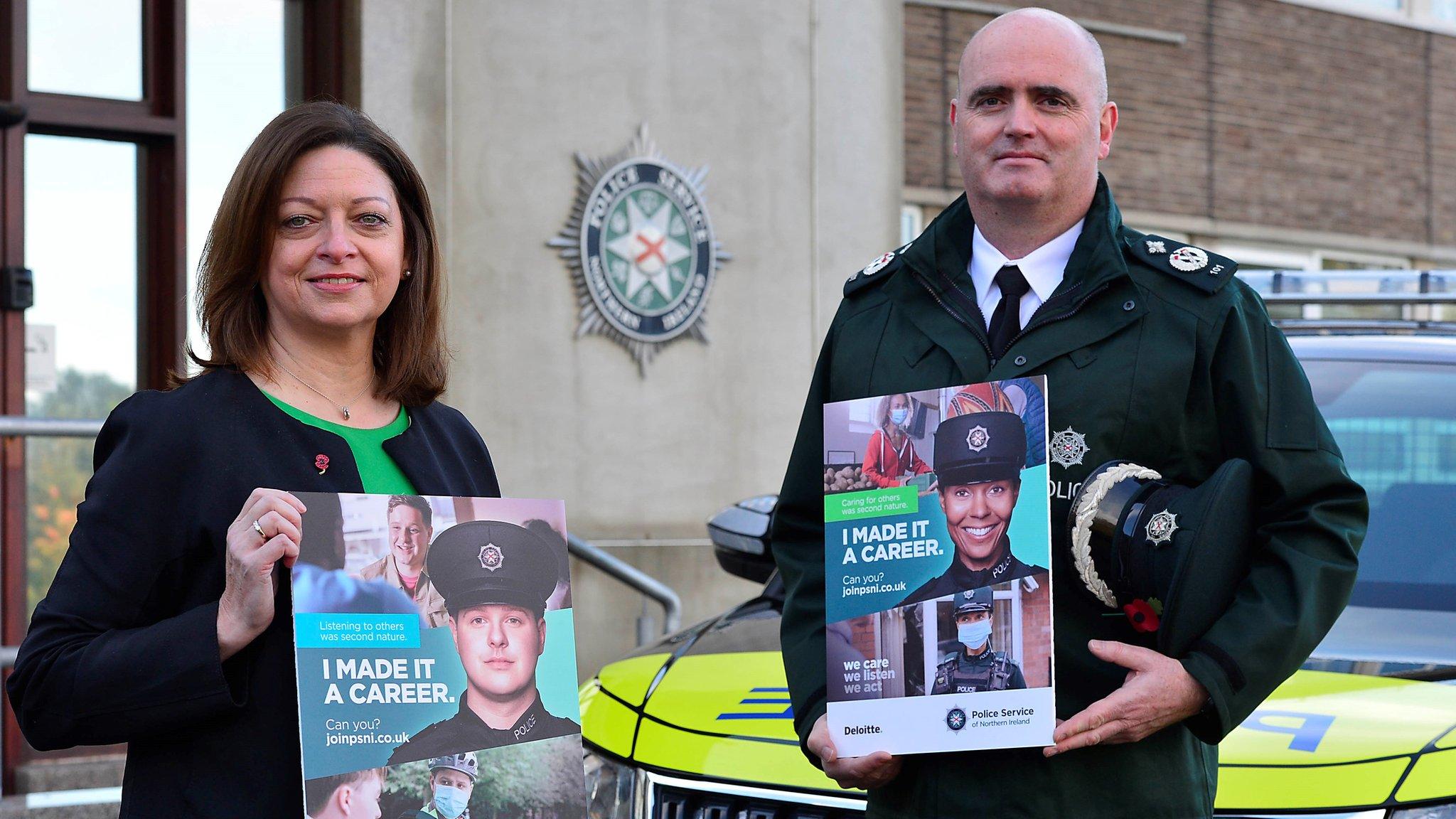PSNI has 550 officers off sick each day, says Simon Byrne
- Published

Simon Byrne says the PSNI is working with its officers to give them the necessary help
Chief Constable Simon Byrne has said the Police Service of Northern Ireland (PSNI) is facing a big challenge with the number of officers off on sick leave.
About 550 officers are absent from duty every day.
In an interview with BBC News NI, Mr Byrne said he was particularly concerned by absences linked to psychological problems.
The PSNI has about 6,700 officers and is facing huge budget problems.
"We have seen an increase in the number of officers sick," said Mr Byrne.
"It is a real concern for us because the biggest change we have seen is the number of people off for psychological reasons.
"We can speculate. Is it about the stress of working more with less resources and people just being burnt out?
"Or is it the effect of worrying about the cost-of-living crisis? Or is it just the drip-drip effect of policing traumatic incidents?"
He said it was "a key challenge" for the PSNI and it was working to provide officers with the help they require.
Mr Byrne, whose contract is to be extended until 2027, set out four key priorities for the PSNI during that term: reset the organisation to reflect the new budget reality, preserve as best he can neighbourhood policing, continue to disrupt crime groups and stay one step ahead of dissident republicans.
The PSNI has said that the positions of 28 officers and staff are under review as part of a widespread re-vetting process which takes place across the organisation on an ongoing basis.
Twenty-three of them are officers and five are civilian staff.
Their cases are currently being examined by a newly established "integrity board". During this process, the individuals "remain in the workplace", according to the PSNI.
Mr Byrne also revealed that another 1,080 officers are on restrictive duties.
That limits the type of work they can carry out and keeps them away from frontline policing roles.
Mr Byrne said that although the number of officers on restrictive duties was just over 1,000 at present, that did not mean every restricted officer "isn't worthwhile for policing".

About 6,700 officers currently work for the PSNI
He said the PSNI was working with occupational health and wellbeing colleagues to see how officers can be equipped with more support.
"You will see some new innovation quite quickly in relation to self-help that officers can do to try and manage some of those difficult issues."
Mr Byrne said that due to the levels of funding for the PSNI and the "current constraints of no government" there is only so many things it can do.
"As the public will see, our treble nine phone performance is impressive. We are one of the top performing organisations in the whole of the UK, we don't want to see that shrink," he said.
"At the moment it is tribute to the efforts and tenacity of our police officers and staff that despite seeing so many people leave, we have kept going and actually our service levels in business terms are quite stable."
'Don't take us for granted'
He said policing had played a key part in the run up to the Good Friday Agreement and beyond and there was frustration "that often our voice isn't heard" in terms of the allocation of funding.
"I think it is self-evident at the moment, either you look at polling in pre-election, some of the commitments from the political parties that with a few exceptions that policing hasn't been anywhere top of the list," he added.
"The thing I will point out to the public is that we enjoy relative levels in terms of peace and safety, in terms of crime levels we are actually the safest part of the UK, so people go about their daily life without risk of burglary and violence in our streets, in the way we might see in other parts of the UK, what is in jeopardy is that feeling of safety and security.
"Don't take us for granted is our message to politicians."
Neighbourhood policing remains a key priority for the PSNI, the chief constable said, despite the potential for cuts in that area.
"We have had to look at every part of the service, to see where the effects of cuts are to be felt, but what we are trying to do now within the 90-day review that I have commissioned is to see effectively how we protect neighbourhood policing."
Mr Byrne said he did not want to set "arbitrary limits" in terms of the number of police officers that should be employed by the PSNI and what the bottom line is.
"We have done some analysis this year, reflecting good practice in England and Wales, and we have called it the service management statements which we will be publishing shortly," he said.
"That gives a sense of where our work is, what the skills of our staff are and where we need to adjust.
"We can use that process a bit like the dials on your stereo of years ago, we can move it up and down to say: 'If you politicians accept that policing will just be responding and nothing else then I make the figure up - 5,000; if you want some pro-activity it might be 6,000 and if you want full bells and whistles it's 7,500'."
- Published2 November 2021

- Published16 May 2021
